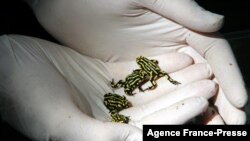For the first time in a laboratory, Australian scientists have produced tadpoles more tolerant of climate change. A team from the University of Western Australia has cross-bred frogs from wetter regions with other species from drier areas to make them more resilient.
Researchers in Australia want to give nature a helping hand. They have warned that climate change “poses an enormous threat to many of the world’s frogs.”
Genetic traits that allow a type of amphibian called a crawling frog to survive in regions with lower rainfall, researchers say, could be passed on through breeding. They’ve mixed frogs from drier parts of south-western Australia with others from wetter areas.
Sperm and eggs from four different crawling frog populations that occur in areas with various levels of rainfall were used in the experiment.
The effort produced tadpoles that were better adapted to climate change and had “increased tolerance to dry conditions.” The world-first laboratory trial has been reported in the journal, Communications Biology.
Jodi Rowley is a lead scientist at the Australian Museum’s citizen science project and an expert in amphibians. She believes that frogs need help to meet the challenges of global warming.
“It does seem a little bit like we are acting God, in some ways, but at this point it is some of the only ways that we are going to be able to have these amazing frogs in the future. The times of just leaving things alone to be protected in these areas [are] not going to work anymore. You know, climate change is moving faster than the frogs are able to adapt themselves. So, we are going to have to do [things], like potentially move animals from one place to the other. Or in this case, give them a little genetic advantage to allow them to be able to persist in this new world that they are going to be living in,” Rowley said.
The University of Western Australia team said that more trials would be needed before these crossbreeding techniques could be applied in the wild to reduce the risk of species extinctions.
Rainfall in south-western Australia has declined in the past 40 years, and it’s a trend that is expected to continue.
The project to boost the climate resilience of crawling frogs was part of research by the Australian government’s conservation initiative, Threatened Species Recovery Hub.
It has examined ways to help at-risk species adapt to climate change.




